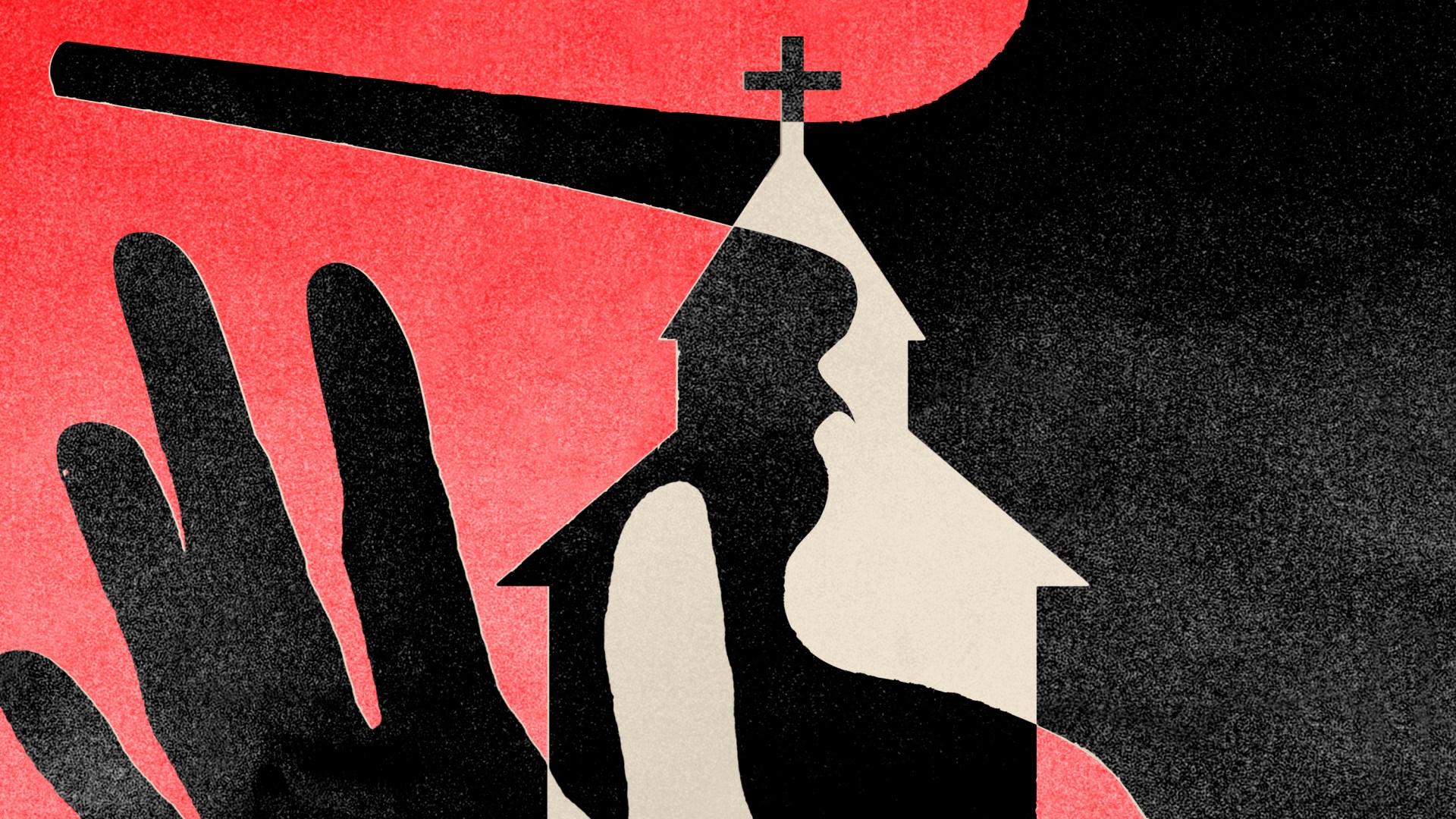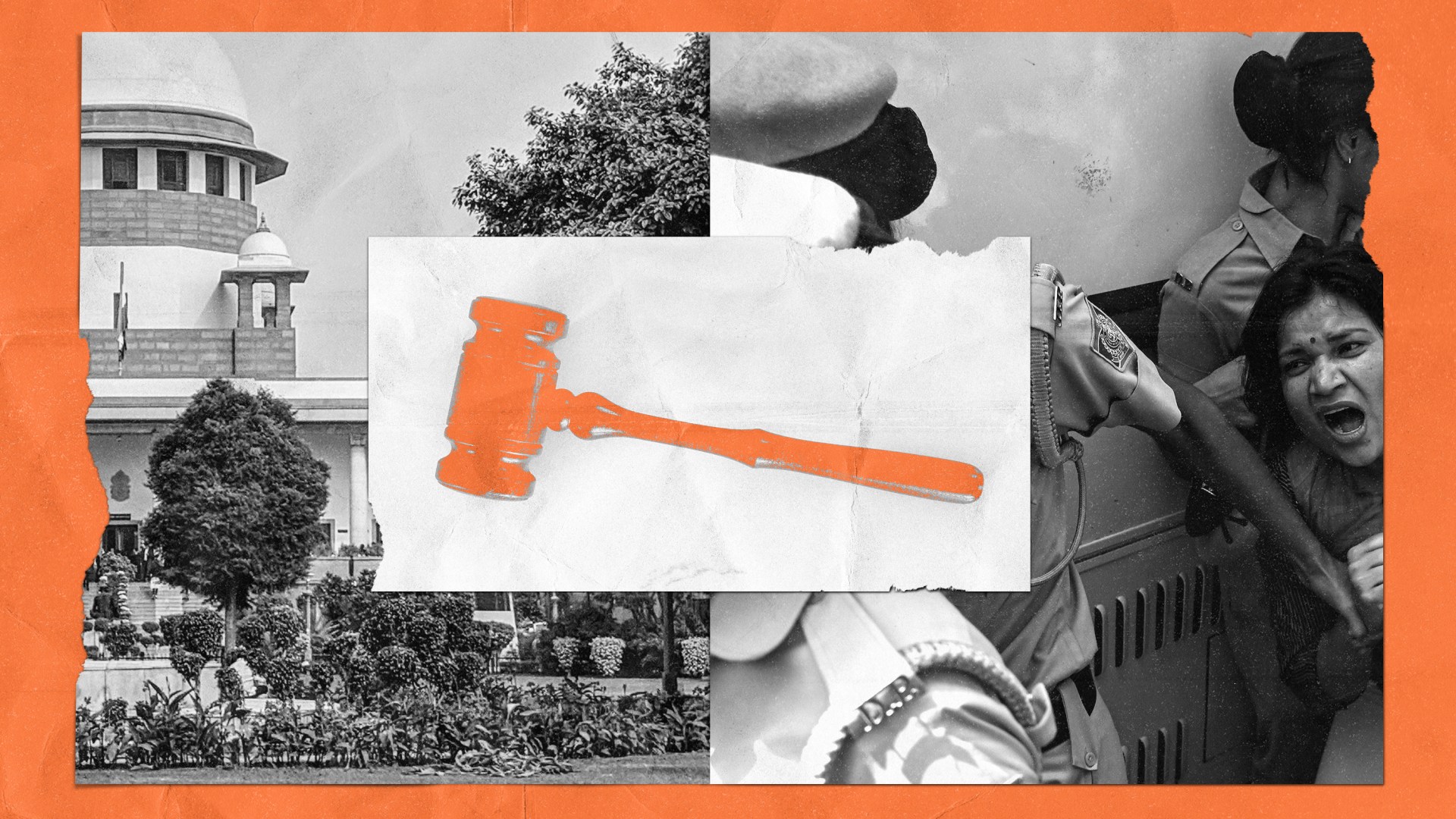For most spectators, the Olympics are a display of the highest level of athletic skill. But for many Christian athletes, they provide an opportunity to express their faith to each other and to the world.
A shared faith brings athletes together with teammates and across nations. This group of Olympians from Australia, Nigeria, Portugal, and other countries sang “Waymaker” in a video posted by Cindy Sember, a British hurdler, who praised God for the other Christian athletes she met at the Olympics.
Elsewhere, gold medalist Yemisi Ogunleye (more on her below) and silver medalist Malaika Mihambo sang “Gratitude,” while their coach, Ulrich Knapp, played guitar and harmonized. The athletes posted the video shortly before the shot put and long jump events, crediting the song with preparing their hearts and minds for competition.
Below are more of the most memorable moments of Christian expression at the Paris Olympics.
Gospel Music Invades Press Conference After German Christian Wins Shot Put
German shot-putter Yemisi Ogunleye got off to a rough start in her competition on August 9, slipping and falling in rainy conditions on her first throw.
Despite a sore knee, Ogunleye recovered with an excellent second throw to qualify for the finals and was in second place entering her last attempt. She rose to the occasion with a throw of exactly 20 meters (65 feet, 7.5 inches), her best ever in outdoor competition, to win gold.
Asked how she approached that decisive final throw, Ogunleye replied, “Before the last attempt, I didn’t think about anything but just lifted my hands and prayed. And that might seem weird to some people, but that is really the source of my peace and joy. … After seeing where the shot landed, when I knew it was hopefully going to be enough for the gold medal, I just went on my knees and said, ‘Thank you, Jesus.’”
At the end of the post-event press conference, the moderator asked Ogunleye, “Is it true that you sing in a gospel choir? What song was going through your head tonight?” She responded with an impromptu rendition of “God Kept Me” by Harvey Watkins Jr.:
I was right at the edge of a breakthrough
But I couldn’t see it.
The devil really held me
But Jesus came and grabbed me
And He held me close
So I wouldn’t let go.
God’s mercy kept me
So I wouldn’t let go.
Surprise Winner Says God Pushed Him over the Finish Line
One of the most classic track and field races in this year’s Olympics led to a grateful comment by a stunning—and perhaps a bit stunned—winner.
The men’s 1500-meter final on August 6 was expected to be a battle between Norway’s Jakob Ingebrigtsen and Josh Kerr of Great Britain. Often, 1500-meter races are highly tactical, with the runners jockeying for position before a last-lap sprint. Not this time. Ingebrigtsen took off at world-record pace and challenged the field to keep up.
Ingebrigtsen held the lead until the last 100 meters, when American Cole Hocker snuck past and then outsprinted Kerr to win by 0.14 seconds. His time of 3:27:65 was an Olympic record and exceeded his previous personal best time by nearly three seconds.
Hocker, a graduate of Cathedral Catholic High School in Indianapolis who posted James 1:2–4 (“Consider it pure joy … when you face trials”) on his Instagram page at the end of his 2023 season, seemed as amazed as everyone else.
Hocker initially tried to pass on the inside but was blocked. When space opened up to Ingebrigtsen’s right, he explained afterward, “I just let God carry me through the finish line.”
He added, “It felt like I was being carried by the energy of the stadium and God. My mind was focused, and my body followed through with the strength and determination I had.”
One of Hocker’s Instagram posts offered a shorter explanation: “God did.”
Historic Gold Medal for Dominican Republic Sprinter
Marileidy Paulino, who started her track and field career running barefoot because she couldn’t afford shoes, became the first woman from the Dominican Republic ever to win Olympic gold on August 9.
Paulino breezed to victory in the 400 meters with a time of 48.17 seconds, which broke an Olympic record that had stood since 1996.
Known for holding up a Bible after earning silver at the Tokyo Olympics three years ago, this time, Paulino knelt in prayer on the track after her victory. In her comments afterward, she thanked God for her opportunity to excel on her country’s behalf. “I don’t come to compete for the money,” she said, “but because I love athletics, to help motivate the younger generations and because these achievements are also doors that are being opened for the future generations of Dominican people.”
“Queen of the Hurdles” Credits God, as Usual
One hundred years ago, Eric Liddell declined to run the 100 meters on a Sunday at the 1924 Paris Olympics, made a last-minute switch to the 400 meters, and won a stunning gold medal. On August 8 of this year, one of the most visible evangelical Christians at the 2024 Paris Olympics delivered an equally stunning performance at the same distance—with 10 hurdles in the way.
Sydney McLaughlin-Levrone, who qualified for her first Olympics while still in high school, broke her own world record in the 400-meter hurdles. Her time of 50.37 seconds won gold with 1.5 seconds to spare. Proportionally, that would be like winning a marathon by more than three minutes.
Video footage of the race shows McLaughlin-Levrone and her chief rival, Femke Bol of the Netherlands, virtually even through six hurdles. But while Bol stutter-stepped and struggled to maintain balance over the last three hurdles, McLaughlin-Levrone ran them in perfect stride, with alternating takeoff legs, as if not even fatigued.
McLaughlin-Levrone has made her Christian testimony widely known through numerous interviews and her book Far Beyond Gold: Running from Fear to Faith.
“I credit all that I do to God. He’s given me a gift, he’s given me a drive to just want to continue to improve upon myself, and I have a platform and I want to use it to glorify him,” she said at Thursday’s post-race press conference in response to an NPR reporter’s question. “So whenever I step on the track, it’s always the prayer of ‘God, let me be the vessel in which you’re glorified, whatever the result is’—how I conduct myself, how I carry myself, not just how I perform. So it’s just freedom in knowing that regardless of what happens, he’s going to get the praise through me. That’s why I do what I do.”
Rebeca Andrade’s Godliness and Grace Earn Competitors’ Love
For much of the world, US gymnast Simone Biles has been the most visible face of the Paris Olympics. On August 5, Biles and teammate Jordan Chiles created a memorable Olympic scene when, in a gesture of sportsmanship, they bowed down to Brazilian competitor Rebeca Andrade on the medals podium.
Andrade had just taken the gold medal in the floor exercise competition, with Biles and Chiles standing on the podium silver and bronze, respectively.
The two US stars referred to Andrade as a “queen,” “icon,” and “legend,” while noting the international friendship they have shared through years of fierce competition.
Andrade, 25, who has had three ACL injuries that required reconstructive surgeries during her career, has not been bashful about directing her thanks to God. She broke into song during an interview after winning silver in the vault competition.
“God was preparing me so that I could achieve my goals today,” she stated. “And the song says, ‘I am preparing you for a new time that is about to come … hold on, I’m doing it perfectly, and you will see.’ And that’s exactly it, you know? He’s doing things that I could never have imagined.”
In an interview two years ago, Andrade credited her Christian upbringing for giving her resilience and said that, to deal with anxiety at the Olympics, “I always took the Bible to the competition and read it when I went to the bathroom.”
She also related how God encouraged her after her third surgery in 2019:
I was in the room I shared with a friend, and mentally I was asking for a hug—because I was far from my mother and my siblings. My friend, who is a heavy sleeper, got up without saying a word and gave me a hug. It was at that moment that I realized God was with me and that he had given me that hug. At that moment, I decided, “I’m not going to stop. If I had to go through this again, it’s because he has something bigger.”
If You Know God, You Can Smile Under Pressure
The high jump is an emotionally intense event, requiring great precision and providing an immediate evaluation of success or absolute failure. That’s what makes this video so incredible. It shows Australian jumper Nicola McDermott flashing a broad smile before attempting to clear 2.02 meters (6 feet, 7.5 inches) at the Tokyo Olympics in 2021.
Maybe McDermott knew something in advance. She cleared the bar cleanly to earn a silver medal in Tokyo. On August 4 in Paris, now married and known as Nicola Olyslagers, she jumped 2.00 meters (6 feet, 6.75 inches) and took silver again.
Or maybe Olyslagers, age 27, smiles because she knows she will praise God no matter what. As she stated on Instagram, “Praise be to God my Rock! He is my strength and song!”
Olyslagers explains on her website, “The satisfaction that I jump and live by was once performance-driven, to bring meaning to life. Yet that all changed when I was introduced to Jesus.”
In addition to sharing her faith openly, Olyslagers has formed a ministry called Everlasting Crowns. She describes its purpose as seeing “fellow athletes transformed by Jesus’ perfect love, planted in churches, and discipled to be a blessing to every place they are sent. Our hope is that they rise up to not only have faith but compete with an eternal perspective.”
Little Countries, Big Hearts, Speedy Legs
It’s been a great Olympics for little-known Caribbean nations. In addition to Shafiqua Maloney’s performance for St. Vincent and the Grenadines (described below), on August 3, Thea LaFond, competing for Dominica, won the women’s triple jump, and Julien Alfred of St. Lucia edged US star Sha’Carri Richardson amid pouring rain in the 100 meters, gaining the title of “world’s fastest woman.”
These were the first Olympic medals of any color for Dominica and St. Lucia. Alfred added a silver in the 200 meters on August 6.
Alfred, who cites Romans 8:18 on her Instagram page, commented in her postrace interview, “I told God that whenever I win, I will give him the glory always, so I thank God for bringing me through, for giving me the strength to come so far.”
LaFond, who achieved her winning distance on the second jump, described the weather conditions as God’s gift to her: “The rain was in my favor. It came down as soon as I was done with the second jump. Thank you, God, for working with me.”
She Overcame Homelessness for Track and Field Glory
“I am a child of God,” reads Shafiqua Maloney’s Instagram bio. Yet this child of God battled homelessness as recently as 2023 on her way to the Olympics.
Last February, the 800-meter runner, who competed in college for the University of Arkansas but represents the Caribbean nation of St. Vincent and the Grenadines, shared that she had been homeless for several months during the previous year.
Maloney’s admission got the attention of her nation’s prime minister, and she received an endorsement contract from a Caribbean water company shortly afterward.
Maloney arrived at Paris ranked 27th in her event but sped through the first two rounds in personal record time to make the finals, where she placed fourth on August 5, just 0.24 seconds short of the bronze medal.
“I’ve been homeless—not having food to eat and all this stuff,” sportswriter Chris Chavez quoted Maloney as saying after she qualified for the finals. “God carried me through all of that and when I got here I had to believe that he didn’t bring me this far just to leave me and that he would carry me straight through.”
Diving Medalist Says, “I Let God Get to Work”
British diver Andrea Spendolini-Sirieix said, “I give glory to God,” and quoted Joshua 1:9 on her Instagram page after earning bronze with partner Lois Toulson in the 10-meter platform synchronized diving competition on July 31.
“This is more than just sport,” she added. “I am proud to represent my country, my family, and glorify the name of Jesus.”
After struggling at the Tokyo Olympics and experiencing mental blocks similar to those faced by US gymnast Simone Biles, Spendolini-Sirieix, daughter of British television personality Fred Sirieix, considered quitting the sport. Instead, she regained strength from her Christian faith, which she has shared without hesitation.
She has described her faith as a “steadying force,” saying that she begins each day with prayer and ends it with Bible study. Asked if she had any superstitions when competing, she replied, “No, I let go and let God get to work. I pray and do Bible study before the competition.”
In Christ, Both Winner and Loser Can Be Victorious
When Brazilian Larissa Pimenta and Italian Odette Giuffrida faced off for a bronze medal in the women’s 52-kilogram judo event on July 28, they already knew each other well.
Very well, in fact. Giuffrida had become a Christian through Pimenta’s influence during a visit to Brazil.
Pimenta won the bout. In her moment of joy and emotion, the first embrace she received was from the friend she had defeated. As she explained in an interview:
She is a special person to me. And what she said was incredibly meaningful. She apeaks Portuguese and we talk quite a lot. Odette came to know God through me—she came to Brazil and found God. And just a few days ago we were talking … about how we were going to give all honor and glory to him. So at that moment … she told me to get up because all honor and glory should be given to him … it was truly significant for me.
Not Your Typical Skateboarder, but He Loves God
“Jesus is king!” shouted 19-year-old skateboarder and fan favorite Cordano Russell when the Olympic announcers introduced him at the men’s street skateboarding final on Monday.
Ranked 16th in the world, Russell, who lives in San Diego but competes for his native Canada, landed his biggest tricks but fell twice and finished seventh. He expressed thanks to his “heavenly Father” on Instagram and vowed to keep training for the 2028 Olympics in Los Angeles.
At 6 foot 3 inches tall and 230 pounds in weight, Russell is far taller and more muscular than the average skateboarder (and he breaks more boards than his smaller competitors). He began skateboarding at age four and convinced his family to move to Carlsbad, California, a hotbed for the sport, when he was eight. Russell displayed potential in high school football but chose pro skateboarding instead.
“It took a lot of praying, a lot of discernment to decide what to do,” Russell told a publication at the University of San Diego, where he will enroll this fall. “The reasoning the Lord showed me was that my love and my heart was set in skateboarding.”
According to the piece, Russell “credits his religious upbringing with instilling the work ethic and mental fortitude needed to excel in the demanding world of professional skateboarding.” He mentors young athletes—and when he misses a trick, you can expect him to yell, “Chicken nuggets!” instead of a swear word.
Fiji: Great Rugby Players, Great Singers for God
The Pacific island nation of Fiji, with fewer than a million people and a total land area about two-thirds of Hawaii, has 33 athletes at the Paris Olympics, 24 of them rugby players. Fiji’s only Olympic medals ever have come in rugby sevens.
Their men’s team had been undefeated in the Olympics: gold in 2016 in Rio when rugby sevens was introduced and gold in Tokyo in 2021. But after 17 straight wins, they fell to the host nation of France in this year’s gold-medal game.
But that loss has not stopped the Fijian team from doing the other thing they’ve become known for: singing praise to God.
The Fijian team has gained worldwide attention for singing hymns with beautiful harmony in an Olympic Village courtyard. Australian water polo player Tilly Kearns posted a video with the comment, “Having the best seat in the Village being next to the Oceania building.”
A classical music website shared the video and explained that the team was singing “Mo Ravi Vei Jisu,” a Fijian hymn. The words translate as “Put your trust into the Lord and he will guide your way.” The website added, “Listening to the video, you might think you’re overhearing a rehearsal by a professional choir. The harmonies, rhythms, musicality and sheer beauty of their resonant voices make it hard to believe these aren’t formally trained musicians.”
Sharing the Gospel in Sign Language
Brazilian Rayssa Leal, who won a silver medal in street skateboarding at the Tokyo Olympics at age 13, followed up with a bronze this year. Before a preliminary run, she turned to the camera and used sign language to communicate John 14:6: “I am the way, the truth, and the life










































